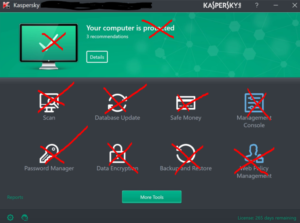- Jan 6, 2017
- 835
After months of speculation, Donald Trump signs new legislation that officially bans the use of Kaspersky Lab products within any part of the US government.
By signing the new defence spending bill into law, the President has purged the Moscow-based antivirus firm from any and all federal agencies amid growing concerns it was vulnerable to Kremlin influence, despite the company’s continual denials.
“Considering the grave risk that Kaspersky Lab poses to our national security, it’s necessary that the current directive to remove Kaspersky Lab software from government computers be broadened and reinforced by statute,” New Hampshire Senator, Jeanne Shaheen, said of the legislation. “The case against Kaspersky is well-documented and deeply concerning. This law is long overdue.”

Kaspersky: No longer protecting US Federal agencies, since December 2017
Federal agencies
The new law is however unlikely to send any US government IT managers into a frenzied panic for the uninstall button. The US had already explicitly prohibited federal agencies from using Kaspersky earlier this year, in September. By signing the new bill, President Trump only served to make the move officially official.
Kaspersky… weren’t they the good guys?
It depends who you talk to. Kaspersky has been seen as a leading light in the antivirus world, and has won hundreds of awards over the years. The security firm has however, come in for sharp criticism in recent months.

Officially banned
According to a New York Times investigation, Israeli intelligence officials had informed it US counterparts that they had personally witnessed Russian hackers successfully bypass and hack US National Security Agency servers using Kaspersky antivirus software.
The allegations automatically ensured that Kaspersky suddenly had many of its US Federal contracts terminated or suspended almost immediately.
For its part, Kaspersky Labs have repeatedly denied that it has any ties to any government, and that it was fully independent of any government influence.
Submit source code
In a final attempt to address the allegations levelled against the company, the firm said it would submit the source code of its software and all future updates for inspection and analysis by independent third parties.
“Congress singled out Kaspersky Lab based solely on the location of its headquarters, resulting in substantial and irreparable harm to the company, its US-based employees, and its US-based business partners,” said a spokesperson for the anti-malware firm. “Kaspersky Lab is assessing whether any further action is appropriate to protect its interests.”
Damage is done
Despite its strenuous allegations, Kaspersky Labs announced that it was to close its Washington, D.C. offices, because they were “no longer viable.”
A senior cyber security official at the Department of Homeland Security, told reporters the day before Trump signed the bill into law, that nearly all government agencies had fully removed Kaspersky products from their networks, in any case, to comply with the September order.
By signing the new defence spending bill into law, the President has purged the Moscow-based antivirus firm from any and all federal agencies amid growing concerns it was vulnerable to Kremlin influence, despite the company’s continual denials.
“Considering the grave risk that Kaspersky Lab poses to our national security, it’s necessary that the current directive to remove Kaspersky Lab software from government computers be broadened and reinforced by statute,” New Hampshire Senator, Jeanne Shaheen, said of the legislation. “The case against Kaspersky is well-documented and deeply concerning. This law is long overdue.”

Kaspersky: No longer protecting US Federal agencies, since December 2017
Federal agencies
The new law is however unlikely to send any US government IT managers into a frenzied panic for the uninstall button. The US had already explicitly prohibited federal agencies from using Kaspersky earlier this year, in September. By signing the new bill, President Trump only served to make the move officially official.
Kaspersky… weren’t they the good guys?
It depends who you talk to. Kaspersky has been seen as a leading light in the antivirus world, and has won hundreds of awards over the years. The security firm has however, come in for sharp criticism in recent months.

Officially banned
According to a New York Times investigation, Israeli intelligence officials had informed it US counterparts that they had personally witnessed Russian hackers successfully bypass and hack US National Security Agency servers using Kaspersky antivirus software.
The allegations automatically ensured that Kaspersky suddenly had many of its US Federal contracts terminated or suspended almost immediately.
For its part, Kaspersky Labs have repeatedly denied that it has any ties to any government, and that it was fully independent of any government influence.
Submit source code
In a final attempt to address the allegations levelled against the company, the firm said it would submit the source code of its software and all future updates for inspection and analysis by independent third parties.
“Congress singled out Kaspersky Lab based solely on the location of its headquarters, resulting in substantial and irreparable harm to the company, its US-based employees, and its US-based business partners,” said a spokesperson for the anti-malware firm. “Kaspersky Lab is assessing whether any further action is appropriate to protect its interests.”
Damage is done
Despite its strenuous allegations, Kaspersky Labs announced that it was to close its Washington, D.C. offices, because they were “no longer viable.”
A senior cyber security official at the Department of Homeland Security, told reporters the day before Trump signed the bill into law, that nearly all government agencies had fully removed Kaspersky products from their networks, in any case, to comply with the September order.

